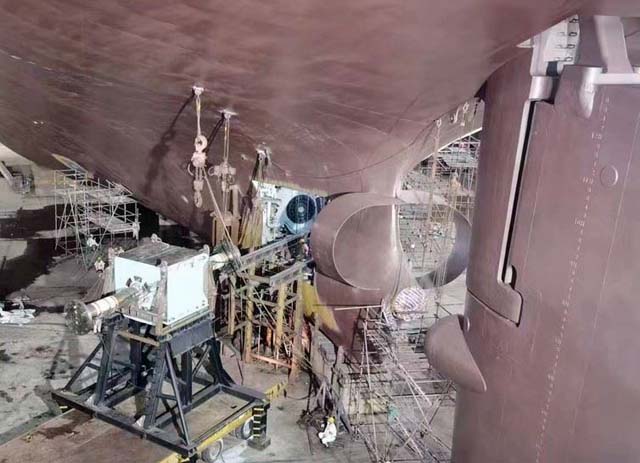Wärtsilä has successfully retrofitted an inline shaft generator system on the ‘Berge Toubkal’, a capesize bulk carrier owned by Singapore-based Berge Bulk.
This is believed to be the marine industry’s first shaft generator retrofit, and its successful completion will improve the vessel’s EEXI while reducing overall carbon footprint.
Shaft generator systems onboard ships are driven by the main engine to supply power to the mains, thus saving fuel and emissions. They are sized to eliminate the need to operate auxiliary engines while at sea. While such systems, also referred to as Power Take-Off (PTO) systems, are today’s standard installations on newbuild vessels, large inline versions with the generator sitting directly on the propeller shaft and turning at 50 to 100 rpm have never before been retrofitted.
Paolo Tonon, Berge Bulk Technical Director, said: “Berge Bulk made an industry commitment to go carbon neutral well before the IMO’s plan, and we are installing now the latest fuel-saving technologies, like shaft generators, air lubrication, or wind propulsion on our vessels. Wärtsilä has a proven track record and is one of the market leaders in shaft generator systems and electrical integration.”
Torsten Büssow, Director Ship Electrification, Wärtsilä, said: “Berge Bulk is one of the front runners in shipping’s transition to decarbonised operations, and we are proud to support them in this. Wärtsilä is actively working on the development of new technologies that can be integrated into existing vessel systems to make their operations cleaner and more economical.”
The retrofitted shaft generator will provide power to an air lubrication system installed at the same time. The system includes a Wärtsilä control system, as well as a converter to allow the generator to operate over a broad span of rpm. The existing intermediate shaft and bearings were replaced to accommodate the increased weight.
Wärtsilä has successfully delivered more than 650 shaft generator systems and has over 50 years of experience in this field. The Berge Toubkal retrofit was completed in Q4 2022, following 10 months of preparation time.



